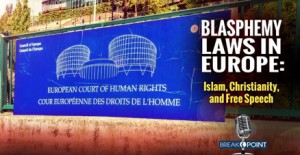Displaying items by tag: Blasphemy
Iran: executions rise amid unrest
Iran recently hanged two men for blasphemy, saying they had insulted the prophet Muhammad and promoted atheism. They were arrested in 2021 and spent months in solitary confinement without family contact. Iran has executed over 203 prisoners this year, but executions for blasphemy remain rare. The recent spate of executions, including members of ethnic minority groups, comes amid continuing protests over the arrest of Mahsa Amini by Iran’s morality police and her death in their custody. Over 500 people were killed and 19,000 arrested in the protests, which have been one of the biggest challenges to Iran’s theocracy since 1979’s Islamic Revolution. Today public frustration extends beyond repressive dress codes. The economy is in poor shape due to sanctions and Iran’s policy incompetence. Inflation is above 40%, currency is a record low, and unemployment tops 10%. Many believe that these anxieties mean further unrest is unavoidable.
Nigeria: religious freedom
Mubarak Bala, an outspoken Nigerian atheist, was sentenced to 24 years in prison after pleading guilty to blaspheming Islam. The landmark case placed freedom of religion and expression under new scrutiny. A BBC Africa documentary entitled ‘The cost of being an atheist’ revealed the challenges which atheists face regarding freedom of speech and thought. Many disengage from social media activities because emotions and outrage are high. Once people discover someone is not a Muslim, they target them. Despite being a minority atheists face discrimination, harassment and persecution in the Muslim north and also in the Christian south.
Pakistan: pray for Pastor Zafar
Zafar Bhatti, Pakistan’s longest serving blasphemy convict (he has been in prison for ten years) had his life sentence increased to hanging in January 2022 - even though every piece of physical and electronic evidence suggests his innocence. His conviction was based on an unsubstantiated report made by police in the early stages of their investigation, when he was beaten into a false confession. He could be killed any day, and is being denied bail on health grounds despite substantial health concerns. Pakistan’s notorious blasphemy laws are evidently being used as a tool for discrimination against a Christian pastor. Staff gave him tablets for diabetes which caused pain and vomit with traces of blood. Doctors changed his medicine and the side-effects stopped. But now (14 May) he has a huge swelling in his left leg, from his feet to the top of his thigh. British Asian Christian Association (BACA) is supporting Zafar and his wife while they suffer the ignominy of this unfounded blasphemy conviction.
A Christmas gift in Lahore
In Pakistan, false accusations of blasphemy are common and often motivated by personal vendettas or religious hatred. Imran was falsely accused of blasphemy and imprisoned for life. On 15 December the Lahore High Court acquitted him and released him, after he had spent over ten years in prison. The development came as a shock to Imran’s family. ‘It is a day of resurrection for us’, Naveed Masih, Imran’s brother, said. ‘God has heard our cry and we are very thankful to Him. It’s a Christmas gift for us.’
Europe - Blasphemy laws
Islam, Christianity, and Free Speech
We think of Europe as secular, progressive, and confidently post-religious. But try criticizing Islam.
Should governments be in the business of protecting people’s feelings? Most Americans, I think would say no. The European Court of Human Rights, however, thinks otherwise. In a historic move last month, the international court affirmed a conviction by a lower court in Vienna against a right-wing speaker who criticized the prophet Muhammad.
Identified only as “E.S.,” the woman, at a seminar in Vienna in 2009, described the founder of Islam as a “pedophile.” According to Islamic tradition, Muhammad was in his fifties when he married his third wife, Aisha, who was six years old at the time. Tradition also says Muhammad waited to consummate their union until the girl was nine.
For describing this relationship in direct though accurate terms, “E.S.” was reported to Austrian authorities, who charged her with “publicly disparaging religious doctrines,” which, believe it or not, is illegal in that country. The Austrian court convicted, describing her statement as “a malicious violation of the spirit of tolerance,” which was “capable of hurting the feelings” of Muslims, and of putting religious peace in Europe at risk.
After a lengthy appeal, the European Court of Human Rights reaffirmed this troubling verdict, ruling that the speaker’s remarks about Muhammad were not only “without factual basis,” but went “beyond the permissible limits of an objective debate,” thereby putting religious peace in jeopardy. So, peace is in jeopardy because Muhammad is critiqued, and not because of how his followers react to the critique?
Set aside for a moment the factual basis of Muhammad’s treatment of his nine-year-old child bride, and the fact that child brides are still shockingly common throughout the Muslim world. The rationale behind these rulings is genuinely scary for another reason.
This idea that speech should be illegal because it threatens “religious peace” is a capitulation to religious violence. Islamic extremists are well known for rioting and even killing whenever they believe someone has “insulted” the prophet Muhammad.
Exhibit A: Asia Bibi, the woman who was just acquitted by the Pakistani supreme court and taken off death row, where she sat for eight years after an alleged slight against the founder of Islam. Bibi now faces the very real possibility of retaliation or assassination by Pakistani radicals and remains trapped in the country.
What the European Court of Human Rights has essentially done is enact a blasphemy law like Pakistan’s, only in the West! Extremists who get violent over perceived insults have been granted veto power over citizens’ free speech. This, just a few years after the Charlie Hebdo massacre in which twelve people—including journalists—were gunned down in Paris over cartoons mocking (ironically!) the violent tendencies of Muhammad and many of his followers.
If guarantees to freedom of speech—which Europe has—do not include the right to say offensive things about religion, such guarantees are not worth the paper they’re written on. If anyone can shut someone else up simply by complaining of hurt feelings, your society is a dictatorship of the easily offended, not free. Caving to the threat of violence will ultimately embolden the violent, not appease them.
Protecting members of a minority religion from hurt feelings is unique to the West. Islamic extremists take advantage of Europe’s indulgence, demanding legal penalties against anyone who criticize Islam. They won’t, of course, ever return the favor. In countries like Saudi Arabia—the birthplace of Islam—a Muslim who converts to Christianity still, to this day, faces the death penalty.
Of course, religious tolerance and free speech arise historically from only one religion, and it isn’t the one founded by Muhammad. Those who think giving up freedom of speech will preserve peace in the long term aren’t insulting our religion. Just our intelligence.
Asia: blasphemy battles
The Commission on International Religious Freedom has issued a report on blasphemy laws globally. The five worst-scoring nations are Iran, Pakistan, Yemen, Somalia, and Qatar, while 71 of the world's 195 countries penalties ranging from fines to imprisonment and death. In Indonesia the influence of radical Islam is being felt, with some districts adopting highly restrictive bylaws; but, praise God, a Jakarta Baptist pastor reports that Christianity is growing there. Pakistan’s Christians fear a rise in persecution after the removal of Prime Minister Nawaz Sharif. Pray for God to cover them with His canopy, particularly the growing 24/7 prayer cells. The Iranian government is particularly concerned about the rise of Christianity, especially among youths. Islamic seminary officials are calling on the government to ‘stop the spread’ of the faith. Ask God to release even more of His angels into the battle between dark and light over Asia.
Canada: new blasphemy laws
Motions against ‘Islamophobia’ are not legally binding but extremists are demanding them as laws. Shutting out any criticism against hardliner behaviour in the West actually means giving extremists a license to commit atrocities. Resolution M-103, seeking to condemn ‘Islamophobia,’ was introduced recently in Canada’s House of Commons, sparking a controversy. A similar motion, labelled M-37, was later tabled in the Ontario provincial legislature and was passed. Like its predecessor it demanded that lawmakers condemn all forms of Islamophobia and reaffirm support for the Anti-Racism Directorate, in order to address and prevent systemic racism across government policy, programmes and services. It is feared that hardliners supporting this form of censorship and other restrictions required by Islamic sharia law aim to blur the line between genuine bigotry and criticism of core problems such as anti-Semitism, violence against women and minors, female genital mutilation, child marriage, etc. Canada already has laws to curb any discrimination or abuse against individuals or groups.
Jakarta: governorship elections
Even though the incumbent governor of Jakarta, ‘Ahok’ Tjahaja Purnama, a Christian, is awaiting trial for blasphemy, he is still in the running in the current elections for his post. In the first poll, on Wednesday, he was ahead, but did not have enough of a lead to take immediate victory. More than a thousand supporters flocked to the campaign headquarters of Ahok and Djarot (his running mate) to welcome the two candidates and watch the most recent quick count results. ‘We wanted to secure a one-round victory. But still, we should thank God for this result’, Ahok added. Anies Baswedan and Sandiaga Uno, their opponents, are close behind, while the third contestant has conceded defeat. This means that there will be a second round between the two remaining pairs of candidates - scheduled for 19 April.
Pakistan: blasphemy laws to remain unchanged
Pakistan’s religious affairs minister has announced that there will be no change to the country’s ‘blasphemy’ laws. Previous attempts to amend the harsh legislation have been blocked, and those proposing changes have faced threats and intimidation. Although the majority charged under the laws are Muslims, Christians and other minorities are disproportionately targeted, and blasphemy accusations are often made to settle personal grudges. Those convicted can face the death penalty for 'defiling the name' of Muhammad: however, to date no one has been executed, although several Christians are among those on death row. On 1 February Adnan Prince, a Christian from Lahore, was granted bail after three years behind bars; despite several charges being dropped, he remains accused of insulting Muhammad.
Pakistan: death threat for supporting a Christian on death row
The son of a murdered Pakistani politician is facing death threats from Islamists because he supported an imprisoned Christian woman who is on death row. Human rights activist Shan Taseer asked for people to support Mrs Asia Bibi, over Twitter this week. Bibi has been sentenced to death, accused of "insulting" Islam after she defended her Christian faith. Muslims in Pakistan are now accusing Taseer of blasphemy against Islam. His father, Salman Taseer, was a Pakistani politician who was killed by one of his own bodyguards for opposing the country's blasphemy laws in January 2011. Shan Taseer's Twitter account can no longer be seen, but tweets with hashtags supporting him are spreading from different accounts.









